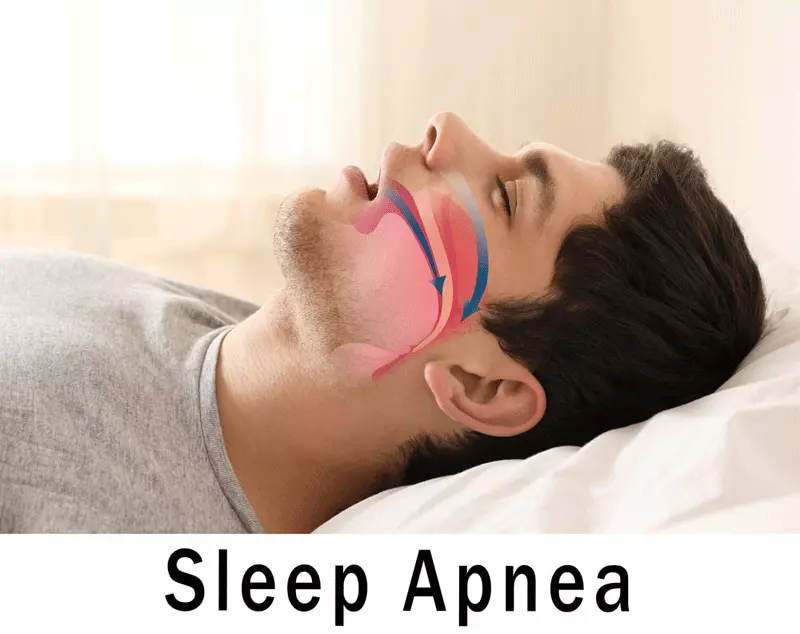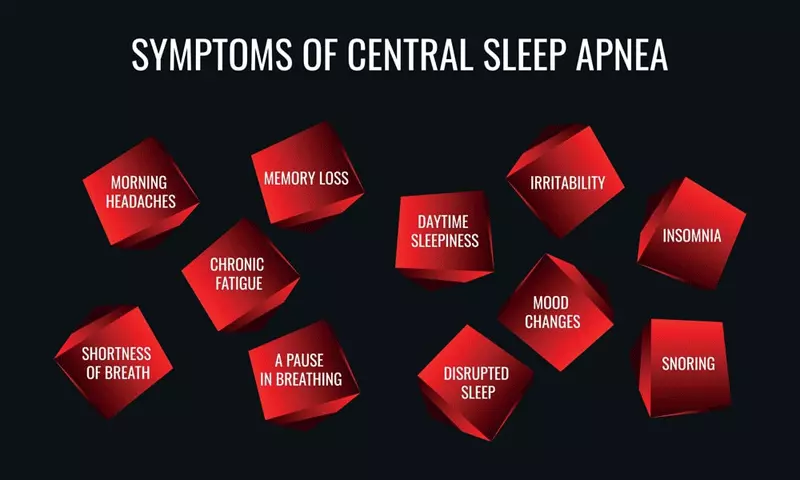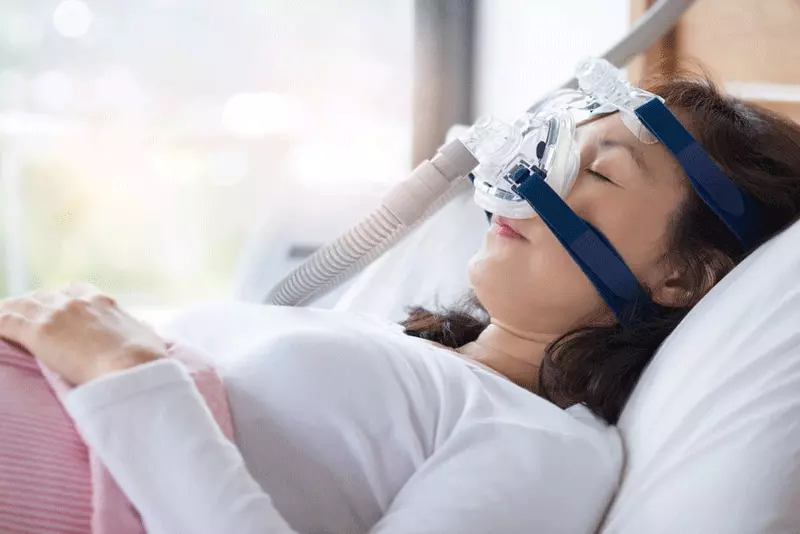The Connection Between Sleep Apnea and Mental Health: Effects and Symptoms
Sep 4th 2023

Beneath the stillness of sleep can lurk a silent menace known as Sleep Apnea – a common disorder marked by frequent breathing interruptions. Even more intriguing (and alarming) is its dubious bond with our mental wellbeing. Not only does it create a cacophony of snores, but a choir of psychological effects too. Through this post, we aim to delve deep into the heart of this nocturnal nemesis, exposing its ties with mental health, exploring its effects and symptoms. Let's uncover this unseen challenge on our journey towards better sleep and optimum mental wellness. Strap in for an enlightening journey that might just change the way you view 'a good night's sleep'.
Sleep apnea can have a significant impact on mental health by causing fatigue, irritability, difficulty focusing, and memory problems. It can contribute to anxiety, depression, bipolar disorder, and schizophrenia. Waking up feeling as if choking or unable to breathe can cause stress in the brain and body leading to additional mental health complications. If you suspect that you may be suffering from sleep apnea, it is important to get treated promptly to prevent further damage to your overall health.
Understanding Sleep Apnea

Sleep apnea is a common sleep disorder that affects millions of individuals worldwide. It is characterized by repeated pauses in breathing during sleep, which can last for a few seconds to a minute. These pauses are typically caused by the relaxation of the muscles in the throat, leading to partial or complete blockage of the airway. As a result, oxygen levels in the body decrease, and the brain signals the individual to wake up briefly in order to resume normal breathing.
Sleep apnea can be categorized into three main types: obstructive sleep apnea (OSA), central sleep apnea (CSA), and complex sleep apnea syndrome (CSAS). OSA is the most common type and occurs when the throat muscles intermittently relax and block the airway. CSA, on the other hand, involves a lack of effort from the respiratory muscles to breathe, signaling a communication problem between the brain and these muscles. CSAS is a combination of both OSA and CSA.
While sleep apnea is often associated with loud snoring and daytime fatigue, it is important to note that it can have far-reaching effects on an individual's overall health, including their mental well-being.
- Sleep apnea is a common sleep disorder that has three main types - obstructive, central, and complex. It can have far-reaching effects on an individual's overall health, including mental well-being. It is important to seek medical attention if you suspect you or someone you know may be suffering from sleep apnea.
Recognizing Sleep Apnea Symptoms

Recognizing the symptoms of sleep apnea is crucial for early detection and effective management of this condition. While not everyone who snores has sleep apnea, it is one of the primary indications. However, it's worth mentioning that not all individuals with sleep apnea snore either. Here are some common signs and symptoms:
Excessive daytime sleepiness: People with sleep apnea may feel excessively tired during the day even after seemingly getting enough hours of sleep at night.
Loud snoring: Intense and disruptive snoring is often associated with sleep apnea, although it may not always be present.
Gasping or choking during sleep: Individuals with sleep apnea may wake up abruptly with a feeling of choking or gasping for air.
Sleep disturbances: Sleep apnea can cause frequent awakenings throughout the night, often accompanied by a feeling of unrestful sleep.
Morning headaches: Waking up with headaches in the morning can be an indication of sleep apnea due to the oxygen deprivation during the night.
For instance, Sarah, a 35-year-old woman, noticed that she was constantly feeling drowsy and irritable during the day, despite getting what she thought was a good night's sleep. She also realized that her partner complained about her loud snoring and occasional moments of breathlessness during the night. These symptoms raised concerns, prompting Sarah to seek medical attention where she was diagnosed with sleep apnea.
Recognizing these symptoms is essential because untreated sleep apnea can lead to serious health complications and impact mental health. It is advisable to consult a healthcare professional if you suspect you or someone you know might be experiencing symptoms related to sleep apnea.
Now that we have discussed understanding sleep apnea and recognizing its symptoms, let’s explore how sleep apnea can significantly impact mental health.
Sleep Apnea's Impact on Mental Health
Sleep apnea, a sleep disorder characterized by pauses in breathing during sleep, not only affects the physical well-being of individuals but can also have a significant impact on their mental health. The effects of sleep apnea on mental health are multi-faceted and can manifest in various ways.
One of the ways sleep apnea affects mental health is through its impact on brain function. Individuals with sleep apnea often experience fatigue, irritability, difficulty focusing, and memory problems due to disrupted sleep patterns. Sleep disruptions can impair cognitive abilities, making it challenging to perform daily tasks effectively. This constant struggle with exhaustion can take a toll on one's mental well-being, leading to mood swings, decreased productivity, and overall decreased quality of life.
Furthermore, research has shown that there are changes in the structures and chemicals of the brain in individuals with sleep apnea. High levels of glutamate and low levels of GABA (neurotransmitters involved in the body's stress response and relaxation) have been found in the brain region responsible for regulating emotions. These imbalances contribute to increased stress levels and difficulty relaxing, which can often lead to anxiety disorders.
- Studies suggest that moderate to severe sleep apnea impacts millions of Americans, causing up to 30 sleep disruptions per hour.
- Research indicates high levels of glutamate and low levels of GABA in the brain region responsible for regulating emotions are found in those with sleep apnea. This condition reportedly leads to stress and difficulty relaxing.
- Sleep apnea is linked to various mental health disorders, increasing the risk of anxiety, panic disorder, depression, bipolar disorder, and schizophrenia.
Anxiety and Depression: Unseen Effects of Sleep Apnea

Waking up feeling as if choking or unable to breathe due to sleep apnea causes a stress response in the body and the brain. This sense of suffocation triggers an alarm system within us that activates our fight-or-flight response. Over time, this chronic stress response can lead to heightened anxiety levels. The constant fear and worry associated with anxiety can interfere with daily life and may even manifest as panic disorder.
Moreover, there is a strong association between sleep apnea and depression. Both conditions share common symptoms such as trouble sleeping, fatigue, moodiness, poor focus, and weight gain. The lack of restful sleep due to sleep apnea disrupts the production of serotonin, a neurotransmitter related to mood regulation. This disruption in serotonin levels can contribute to the development of depressive symptoms.
It is important to note that sleep apnea not only increases the risk of anxiety and depression but has also been associated with an increased risk of other mental health conditions such as bipolar disorder and schizophrenia.
For instance, John, a 35-year-old struggling with undiagnosed sleep apnea, found himself feeling anxious throughout the day due to constant tiredness and difficulty concentration. His irritability often led to conflicts at work and strain in his personal relationships. With the support of professional treatment for sleep apnea, including oral appliance therapy, John's sleep improved significantly, leading to a decrease in his anxiety symptoms and an improvement in his overall mental health.
Sleep Deprivation Leading to Cognitive Impairment

Sleep deprivation is more than just feeling tired and sluggish throughout the day. It can have significant impacts on cognitive function and overall brain health. When sleep apnea disrupts your sleep, it deprives your brain of vital restorative processes that occur during deep sleep stages. As a result, you may experience various cognitive impairments.
During deep sleep, the brain undergoes a process of memory consolidation, where it strengthens and solidifies memories from the day. However, with sleep apnea interrupting this crucial phase, you may struggle with memory problems and difficulty retaining information. This can impact various aspects of your life, from academic performance to work productivity.
In addition to memory issues, chronic sleep deprivation caused by untreated sleep apnea can lead to difficulties with concentration and focus. The lack of quality sleep can make it challenging for individuals to stay alert and engaged during tasks that require sustained attention. This can be particularly concerning in professional settings or when operating heavy machinery.
Furthermore, insufficient sleep due to recurrent awakenings caused by sleep apnea can result in problems with executive function. These higher-level cognitive abilities include decision-making, problem-solving, and planning. When compromised by sleep deprivation, these skills may become impaired, leading to decreased productivity and hindering daily functioning.
It’s important to note that the consequences of cognitive impairment resulting from sleep apnea are not limited to daytime activities. They can also impact your emotional well-being and have a profound effect on mental health.
Imagine struggling with memory recall while trying to complete an important project at work or feeling frustrated due to poor concentration during important meetings. These challenges can cause stress, anxiety, and even feelings of inadequacy or depression as a result of underperformance.
Therefore, addressing and treating sleep apnea is crucial not only for better physical health but also for maintaining optimal cognitive function and overall well-being.
Now that we understand how sleep deprivation due to sleep apnea can lead to cognitive impairment, let’s explore the dangers of ignoring this condition.
Dangers of Ignoring Sleep Apnea
Sleep apnea is not a condition that should be taken lightly, as it poses various risks and dangers when left untreated. Ignoring sleep apnea can have severe consequences for both your physical health and mental well-being.
One of the primary dangers of undiagnosed or untreated sleep apnea is the strain it puts on the cardiovascular system. The repeated pauses in breathing during sleep can lead to increased blood pressure, which puts a significant burden on the heart. Over time, this can raise the risk of heart disease, heart attacks, and stroke.
Another concerning aspect is the impact on mental health. Chronic sleep disruptions caused by sleep apnea affect brain function and can lead to mood disturbances such as irritability, anxiety, and depression. The lack of quality restorative sleep deprives the brain of necessary rejuvenation, leading to emotional instability and difficulty managing stress.
Imagine waking up multiple times throughout the night feeling as if you're choking or unable to breathe. This constant fear and distress can trigger a stress response in your body and contribute to feelings of anxiety. It becomes a vicious cycle where anxiety further disrupts sleep, exacerbating symptoms of both conditions.
Additionally, researchers have found correlations between sleep apnea and an increased risk of developing psychiatric disorders such as bipolar disorder, schizophrenia, and panic disorder. Although the exact mechanisms are still being studied, it is believed that chronic sleep disruptions and changes in brain chemistry play a role in these associations.
Understanding the dangers associated with ignoring sleep apnea emphasizes the importance of seeking diagnosis and treatment. By addressing this condition proactively, individuals can mitigate these risks and improve both their physical health and mental well-being.
Risk of Substance Use Disorders

Sleep apnea not only disrupts your sleep patterns and affects your overall health but also significantly impacts your mental well-being. One concerning aspect is the increased risk of developing substance use disorders for individuals with untreated sleep apnea. This connection stems from the attempt to self-medicate or find relief from the debilitating symptoms that come with sleep deprivation.
Imagine Ashley, a hardworking professional who struggles with undiagnosed sleep apnea. She finds herself constantly exhausted, irritable, and unable to concentrate during the day due to disrupted sleep at night. In an attempt to alleviate these symptoms and find some relief, Ashley turns to substances like alcohol, sleeping pills, or other drugs.
Sleep-aid medications or alcohol may provide temporary relief by inducing drowsiness, but they do not address the underlying issue of sleep apnea. Over time, these substances can create a dependency and lead to substance abuse disorders. Moreover, while they may help initiate sleep, they often result in poor-quality rest and aggravate breathing difficulties during sleep.
The association between sleep apnea and substance use disorders underscores the importance of seeking appropriate treatment for sleep apnea. By addressing the root cause of sleep disturbances, individuals can avoid resorting to substances that can further disrupt their physical and mental health.
Now that we have explored the risks of substance use disorders associated with untreated sleep apnea let's shift our focus towards navigating effective treatments for this condition.
Navigating Sleep Apnea Treatments

When it comes to managing sleep apnea, there are various therapeutic options available. The choice of treatment depends on the severity of your condition, personal preferences, and recommendations from healthcare professionals. Let's explore a few common strategies for effectively addressing sleep apnea:
Continuous Positive Airway Pressure (CPAP): CPAP is considered the "gold standard" treatment for moderate to severe obstructive sleep apnea. It involves wearing a mask connected to a pump that provides pressurized air, keeping the airway open during sleep. CPAP therapy helps maintain a steady flow of air, preventing pauses in breathing.
Oral Appliance Therapy (OAT): This treatment involves using a custom-fitted oral device similar to a mouthguard that helps reposition the jaw and tongue to keep the airway open while you sleep. OAT is commonly recommended for mild to moderate obstructive sleep apnea or when CPAP is not well-tolerated.
Lifestyle Changes: Certain lifestyle modifications can have a positive impact on managing sleep apnea. These may include weight loss, regular exercise, avoiding alcohol and sedatives, maintaining a regular sleep schedule, and improving sleep hygiene practices.
Surgical Interventions: In cases where other treatments prove ineffective or inappropriate, surgical procedures may be considered. These surgeries aim to remove excess tissue or correct structural abnormalities in the airways.
Emerging Treatments: Keeping up with advancements in medical research is crucial as new treatments for sleep apnea continue to emerge. For instance, an innovative technique called Excite OSA has shown promise in training tongue muscles using mild electrical pulses during the day, leading to positive results in around six weeks.
It’s important to work closely with your healthcare provider to determine the most suitable treatment approach for your specific needs. They will consider factors such as the severity of your condition, medical history, and potential benefits and drawbacks of each treatment option.
Therapies and Strategies for Sound Sleep

When it comes to managing sleep apnea and promoting a good night’s rest, there are various therapies and strategies available. These approaches aim to improve the quality of sleep and reduce the symptoms and risks associated with sleep apnea.
Let’s take a look at some effective therapies and strategies for sound sleep:
Continuous Positive Airway Pressure (CPAP): CPAP therapy is often considered the gold standard treatment for sleep apnea. It involves wearing a mask over the nose or mouth while sleeping, which delivers a constant flow of air to keep the airways open. CPAP helps prevent pauses in breathing and reduces snoring, ensuring uninterrupted sleep.
Oral Appliance Therapy: For those who find CPAP uncomfortable or inconvenient, oral appliance therapy can be an alternative option. This therapy involves wearing custom-made devices, similar to mouthguards, that help position the jaw and tongue to keep the airways open during sleep.
Lifestyle Modifications: Making certain lifestyle changes can significantly contribute to better sleep quality. These modifications may include maintaining a regular sleep schedule, practicing good sleep hygiene (such as creating a relaxing bedtime routine and ensuring a comfortable sleep environment), maintaining a healthy weight through exercise and balanced diet, avoiding alcohol and smoking before bedtime, and minimizing caffeine intake.
Positional Therapy: Some individuals experience more significant breathing difficulties when sleeping on their back. In such cases, positional therapy may be beneficial. This approach involves using special devices or techniques that encourage side sleeping, helping to keep the airways clear and promote better breathing.
Weight Management: As excess weight can contribute to the narrowing of the airways, losing weight can have a positive impact on managing sleep apnea. Engaging in regular physical activity, following a healthy diet, and seeking guidance from healthcare professionals or nutritionists can aid in weight management and potentially improve sleep apnea symptoms.
Behavioral and Cognitive Therapies: Sleep apnea can cause emotional distress and impact mental well-being. Behavioral and cognitive therapies, such as cognitive behavioral therapy for insomnia (CBT-I), can help individuals develop healthier sleep habits, manage anxiety or stress related to sleep disorders, and promote better overall mental health.
Alternative Therapies: Some individuals find relief through alternative therapies like acupuncture, yoga, or meditation. While further research is needed to fully support their effectiveness in managing sleep apnea, these practices may assist with relaxation, stress reduction, and improving sleep quality.
Remember, it is essential to consult with healthcare professionals or sleep specialists to determine the most suitable therapy or strategy based on individual circumstances. They can provide personalized guidance and monitor progress to ensure optimal treatment outcomes.
By exploring and implementing a combination of these therapies and strategies for sound sleep, individuals with sleep apnea can take proactive steps toward improving their overall well-being and reducing the impact of sleep apnea on their mental health.
